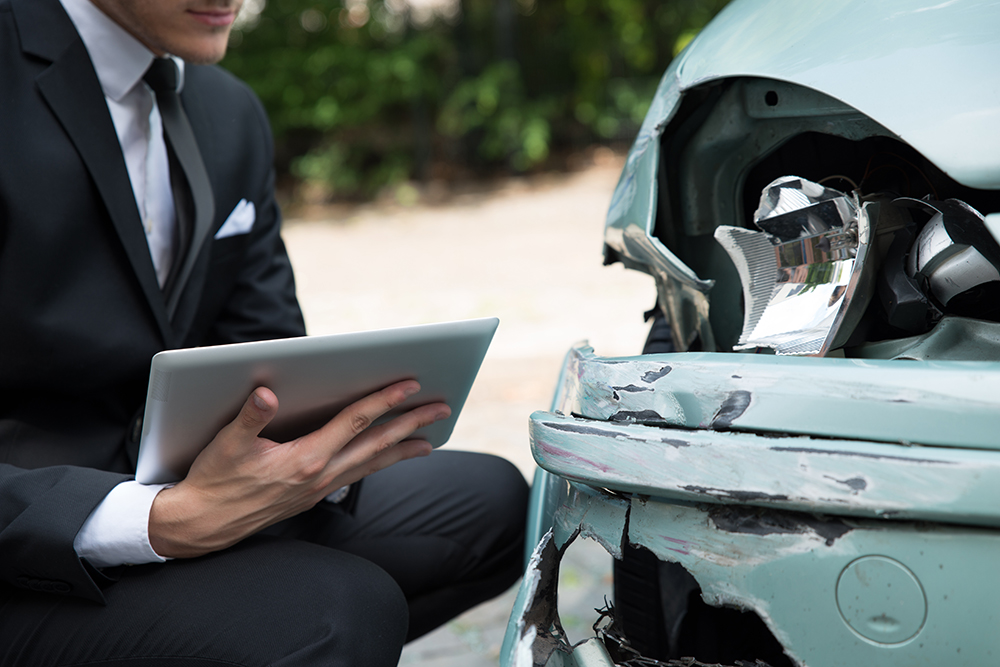
It can happen to any of us. It can almost seem inevitable. You’re driving around town when WHAM, you get into an accident. Once the dust settles and your heart stops racing, you’re left inspecting the damages and discovering that your once-pristine car is now in need of repairs. Your first knee-jerk reaction will be to get your vehicle repaired at any cost. After all, this car is your baby and you want it to look like it did before the accident! But is it worth fixing your car after you’ve experienced an accident? To get a better understanding, you may want to consider weighing your car’s depreciated value against the cost of the required investment necessary to repair it.
To determine the value of your vehicle, you can visit the websites of a few different organizations. The most well-known is probably Kelley Blue Book, with the National Association of Automobile Dealers being another reputable source. Either of these resources can provide you with the tools necessary for determining the value of your car based on its make, model, year, and general condition.
Checking the value of your vehicle is a good habit for any car owner (sort of like checking your credit score) but understanding your car’s value can be particularly vital when deciding whether it’s worth repairing your car or if you’d be better off cutting your losses and getting another. Many times, fixing your damaged car will be the best option – especially if the repairs will be covered by your auto insurance. Buying a new car can be costly, leaving you with five or more years of debt, while getting it repaired (depending on the damages) might cost you a few thousand dollars. Before you finalize this decision, you’re going to want to know as much about your vehicle’s value as possible so you can make sure this affordable, short-term decision won’t cost an arm and a leg when you trade your vehicle in for a new one a few years down the line.
If you’ve been in an accident, it’s likely you’ve already spoken to your insurance agent, and the agent has scheduled a time for you to meet with a claims adjuster. The adjuster’s role is to verify the damages and to make a determination on what the cost of repairing your car will be. The claims adjuster’s estimate can serve as a great benchmark for the insured; however, no good insurance company will expect you to accept this number blindly. Most agents will recommend that you go out and get one or more estimates from the auto body shop of your choice.
Insurance companies cannot pressure you into seeing a particular mechanic, though they might request that you get estimates from more than one. Don’t be surprised if your insurance company chooses to go with the auto body shop that is offering the lowest estimate, but also don’t hesitate to raise your concerns about working with that particular shop if you don’t feel they will offer the best service for your vehicle. You are free to push back on your adjuster or agent if you feel that another auto body shop will provide more adequate repairs to your car. You’re looking out for your best interest and that’s okay!
One thing that may affect the total of your claim is something known as “betterment.” Just as your car can depreciate with time and wear, some insurance companies might determine that the cost of your vehicle will actually go up with the installation of new parts. Often times, this is only applicable for larger parts, such as a new transmission or engine block. It can happen with other parts as well, if your adjuster feels that the repairs would make your car more valuable than it was before the accident. In these cases, your insurance company may opt to only pay for the difference between the new part and what it would cost for a used part of the appropriate age and condition of your vehicle.
Only your insurance provider can determine if your car is considered a total loss. If it is determined a total loss, they will pay you the value of your vehicle (as seen on KBB and NADA). If totaled, your insurance agent won’t make any argument for repair but you still may want to negotiate for a higher settlement than they initially offer. This might take some work on the part of the insured, proving the value of each piece of the car and what value it brought to the vehicle’s total. Mileage and service records are two things that might be used as evidence of the vehicle’s value over time. Should you feel that you’re not getting the full value of your car in your settlement, it’s worth putting in a little work. You’ve suffered the loss of a major piece of capital and you deserve to be paid for every dollar of what it is worth.
This is why it’s important to know the value of your vehicle and to keep track of all records that could help substantiate these estimates. The more you know about your vehicle, the better you can understand its value and whether it’s worth fixing after you’ve experienced a car accident. It could be that repairing your car will be the best, most affordable solution but you won’t know if you don’t do a little research beforehand. The more information you have, the more empowered you will be to get the money that you deserve, to repair the damages that require repairing, and to get your car back out on the road in no time flat.
Get your car back on the road and schedule an appointment today.

